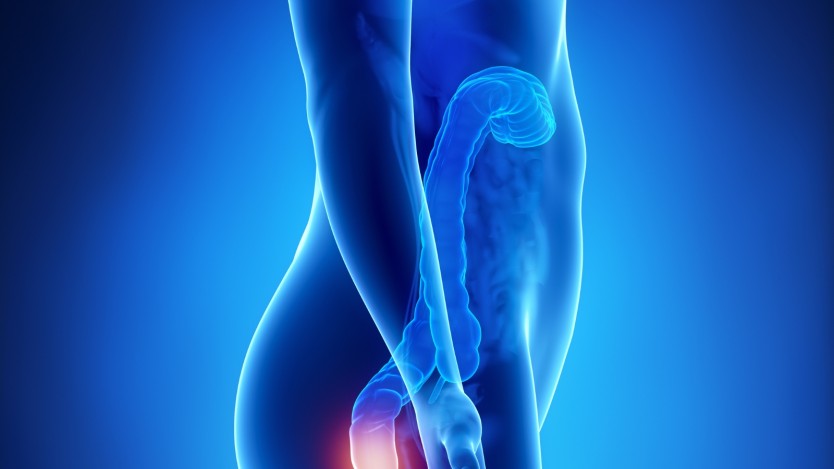Which specialist doctor treats haemorrhoids?

- Haemorrhoids, a very common problem
- Specialists who treat haemorrhoids
- Haemorrhoid specialists at Operarme
- Request a free consultation with Operarme’s specialists
Haemorrhoids, a very common problem
- Haemorrhoids are a problem that affects a large part of the population.
- Treatment of haemorrhoids by a primary care physician or a specialist will depend on the severity of the haemorrhoids and the patient's symptoms.
- Haemorrhoids are treated and diagnosed by the general practitioner, proctologist, gastroenterologist and colorectal surgeon.
Many people who suffer from haemorrhoids or piles wonder whether it is necessary to visit a doctor to treat this problem, as the fact that it is a common problem leads to it being downplayed. In addition, people are often embarrassed to talk about it and explain their situation to a specialist.
In other cases, the patient does not have serious symptoms, so they do not worry too much about seeing a specialist.
However, when you have haemorrhoids you should put aside your embarrassment and visit a specialist as soon as possible, as the sooner the problem is diagnosed, the sooner it can be solved.

Specialists who treat haemorrhoids
We will now explain the specialists who treat haemorrhoids and who will be able to guide the patient in each case. We will also discuss their role in the treatment and cure of haemorrhoids.
General practitioner
Normally, when suffering from haemorrhoids, you will usually visit your GP, who will be responsible for sending you to see a specialist if necessary.
Once at the doctor, the patient will discuss their symptoms with the doctor, who will give their diagnosis and advise them on a course of treatment to treat the haemorrhoids.
The GP will carry out a more general check-up of the haemorrhoids, and may even prescribe creams, painkillers, etc. to try to relieve symptoms such as itching or pain that can be caused by haemorrhoids. It is also common for them to recommend that the patient follow a diet rich in fibre to help soften the stool so that they do not feel pain after a bowel movement.

Get rid of your haemorrhoids with Operarme
Request a free and immediate appointment with our specialists in general surgery and proctology
Other measures that the doctor may recommend are drinking plenty of water a day (at least one and a half litres), taking sitz baths after bowel movements to maintain hygiene in the anal area, walking and doing some sport, etc. In addition, you may be advised against eating certain foods that could worsen the condition of the haemorrhoids, such as spicy food, coffee, fatty foods, etc.
In the event that the treatment recommended by the general practitioner to treat haemorrhoids does not work correctly, or in the event that the patient has other more severe conditions or the symptoms are more serious, he or she will most likely recommend a visit to a doctor who is more specialised in the subject. This doctor will be a general surgeon or proctologist.

General surgeon specialising in proctology
Before going on to explain what a proctologist does, we need to explain what proctology is.
Proctology is a part of general surgery and the digestive system. It is the part that diagnoses and treats problems related to diseases of the rectum and anal area.
The proctologist (within general surgery, as proctology is a part of general surgery) is the specialist in charge of treating diseases and pathologies of the rectum and anal area. He is the one who has the most information and training to treat haemorrhoids.

Some of the functions performed by a general surgeon specialising in proctology include:
- Diagnose and effectively treat haemorrhoids on an outpatient basis (without the need for hospitalisation of the patient).
- Diagnose and appropriately treat diseases of the rectum and anal area.
- Diagnose and treat other problems of the rectum, such as fissures or anal fistulas.
When diagnosing haemorrhoids, the surgeon will perform a physical examination of the patient consisting of the following steps:
Firstly, the specialist will perform a rectal examination to confirm the diagnosis or even to detect other possible problems in the anal canal. In the event that the specialist considers carrying out a more in-depth examination, he will perform an anoscopy of the anal canal, which will allow him to see the state of the anal canal and the state of the haemorrhoids, in the event that they are internal.
Other tests that the general surgeon proctologist may perform to rule out more serious problems include colonoscopy (examination of the colon) and sigmoidoscopy (examination of the rectum and lower colon).
When the proctology specialist has carried out the relevant tests, he or she will inform the patient of the best treatment in their case. In other cases where the haemorrhoid problem is more severe, he or she may recommend surgery to remove it.
Removal of haemorrhoids
General surgeons specialising in proctology are also responsible for surgical procedures related to the colon and rectum, including the removal of haemorrhoids.
Removal of the haemorrhoidal veins that give rise to haemorrhoids can be performed on an outpatient basis, lasting approximately 60 minutes.
In particular in cases where the haemorrhoids are grade III or IV (remember that they are classified according to their severity in IV degrees), their removal is necessary.

Do you need haemorrhoids surgery?
Request a free and immediate appointment with our specialists in General Surgery
Haemorrhoid specialists at Operarme
Operarme offers its patients the best experts in general surgery who specialise in surgery of the digestive system and, therefore, in proctology who, among other types of interventions, are also responsible for the removal and treatment of haemorrhoids:
Dr. Jaime Vázquez Echarri, Madrid
He graduated in Medicine and Surgery at the Autonomous University of Madrid, where he also specialised in General and Digestive System Surgery. Shortly after, he obtained his doctorate at the University of Alicante.
During his professional career, Dr. Vázquez has worked as a doctor at the Hospital Fundación Jiménez Díaz in Madrid, the Hospital Comarcal de Elda, the Hospital Provincial San Juan de Dios in Alicante and the Hospital Severo Ochoa in Madrid. Dr. Vázquez currently works as a private doctor at the Rokava Clinic in Madrid and as a specialist at the Severo Ochoa Hospital, where he is head doctor of the general surgery and digestive system service.
In addition to his work, he is a lecturer at the Alfonso X el Sabio University in Madrid and has published more than 170 papers in Spanish and foreign medical journals. He has also given presentations at scientific meetings and congresses.
As for his work at Operarme, Dr. Vázquez practices as a private physician performing general surgery and digestive system operations at the Hospital Clínica Santa Elena in Madrid, where he operates on haemorrhoids, among other conditions such as fistulas, fissures, lipomas, etc.
To find out more about Dr. Jaime Vázquez Echarri click here.
Dr. Eduardo Garaizabal Gaiztarro, Vizcaya
He has a degree in Medicine from the University of Bilbao (Vizcaya) and specialises in General and Digestive System Surgery.
In terms of his professional activity, we can highlight the two years he worked at the Hospital de San Juan de Dios de Santurce in Biscay and at the Dr. Guerra Clinic in Bilbao.
It is worth mentioning his work as head of surgery for the Social Security for three years, although from 1989 to the present he has been working in private practice.
Dr. Garaizabal is constantly updating his knowledge due to the courses on surgery, the digestive system and surgical techniques that he often attends in Madrid and Barcelona. He is also a member of the Spanish Society of General Surgery and Digestive System, Coloproctology and Surgery of Obesity and Metabolic Diseases.
At Operarme, Dr. Garaizabal performs general and digestive system surgery at the IMQ Virgen Blanca Hospital in Bilbao.
To find out more about Dr. Eduardo Garaizabal click here.
Dr. Antonio Gasós Laviña, Zaragoza
He specialises in General and Digestive System Surgery at the University of Barcelona.
Dr. Gasós has been practising his profession as a surgeon for more than 30 years, as well as having worked as President of Cáritas Diocesana de Zaragoza (2004-2008) and having been co-founder and first President of the Aragón Women's Helpline until 2011.
From 1984 to 2014 he worked at the CME Ramón y Cajal in Zaragoza and currently, Dr. Gasós works as an Area Specialist at the Miguel Servet Hospital in Zaragoza, where he is a General and Digestive System Surgeon.
He is also a Specialist at the Viamed Montecanal Hospital in Zaragoza, where he works as a General and Digestive System Surgeon, also collaborating with Operarme.
To find out more about Dr. Antonio Gasós click here.
Dr. Antonio Oliva Soler, Barcelona
He’s a graduate in medicine and surgery from the Autonomous University of Barcelona, Dr. Oliva is currently a surgeon specialising in General Surgery and the Digestive System and has a PhD in Medicine.
As for his professional activity, he began his career working in the Surgical Research Unit of the Municipal Institute of Medical Research of Barcelona and later in the General Surgery Service of the Hospital Universitario del Mar in Barcelona, where he became Head of Residents in General Surgery.
Once there, from 1996 to 2011, Dr. Oliva combined his work with his activity as Assistant Doctor of General Surgery at the Hospital Municipal de Badalona, as Surgeon of the Surgery team at the Hospital de Barcelona S. C. I. A. S. and Coordinator of Emergency Surgery at the Clínica Remei in Barcelona, where he has been Medical Director since 2011.
Dr. Oliva collaborates with Operarme at Clínica Ntra. Señora del Remei in Barcelona, carrying out surgeries related to his specialty.
Find out more about Dr. Antonio Oliva Soler by clicking here.
Dr. Jairo Avella Vega, Málaga
He’s a graduate in medicine and surgery from the Universidad Juan N Corpas, Dr. Avella is currently a surgeon specialising in General and Thoracic Surgery at Hospital Dr. Galvez in Malaga.
Dr. Avella has more than 30 years of experience and is an expert in abdominal wall pathology, hernias, inguinal hernia, proctological pathology, haemorrhoids, anal fissure, gallbladder pathology, skin and soft tissue tumours, pathology and benign tumours and breast cancer diagnosis and surgical treatment, colon pathology, emergency pathology and thoracic pathology.
Learn more by clicking here.
Dr. Juan Ángel Fernández, Murcia
Dr. Juan Ángel Fernández Hernández was born in Molina del Segura (Murcia) in 1969 and trained in Medicine and Surgery at the Faculty of Medicine of the University of Murcia. After graduating in Medicine, he continued his training in the United States and enjoyed two training stays in Minneapolis and at the Johns Hopkins School of Medicine in Baltimore.
He completed his residency at the Hospital Clínico Universitario Virgen de la Arrixaca in Murcia where he specialised in General and Digestive Surgery.
He is currently head of the mesenchymal tumours and sarcomas section at the Hospital Clínico Universitario Virgen de la Arrixaca, as well as working in the General Surgery team at the Hospital Mesa del Castillo in Murcia.
He collaborates with Operarme in different surgical interventions of his speciality, such as inguinal hernia repair or lipoma removal among others, at the Hospital Mesa del Castillo.
Dr. Fernández is fluent in English, so he is used to treating foreign patients.
Learn more about the doctor, clicking here.
Request a free consultation with Operarme’s specialists
As we can see, all the specialist doctors who work with Operarme are highly reputable throughout Spain and trustworthy due to their extended experience.
If you would like to make an appointment with one of them, do not hesitate to request a free consultation in the following banner:

Do you need to surgically remove your haemorrhoids?
Request a free and immediate appointment with our specialists and get a surgery date
Medical disclaimer: All the published content in Operarme is intended to disseminate reliable medical information to the general public, and is reviewed by healthcare professionals. In any case should this information be used to perform a diagnosis, indicate a treatment, or replace the medical assessment of a professional in a face to face consultation. Find more information in the links below:
